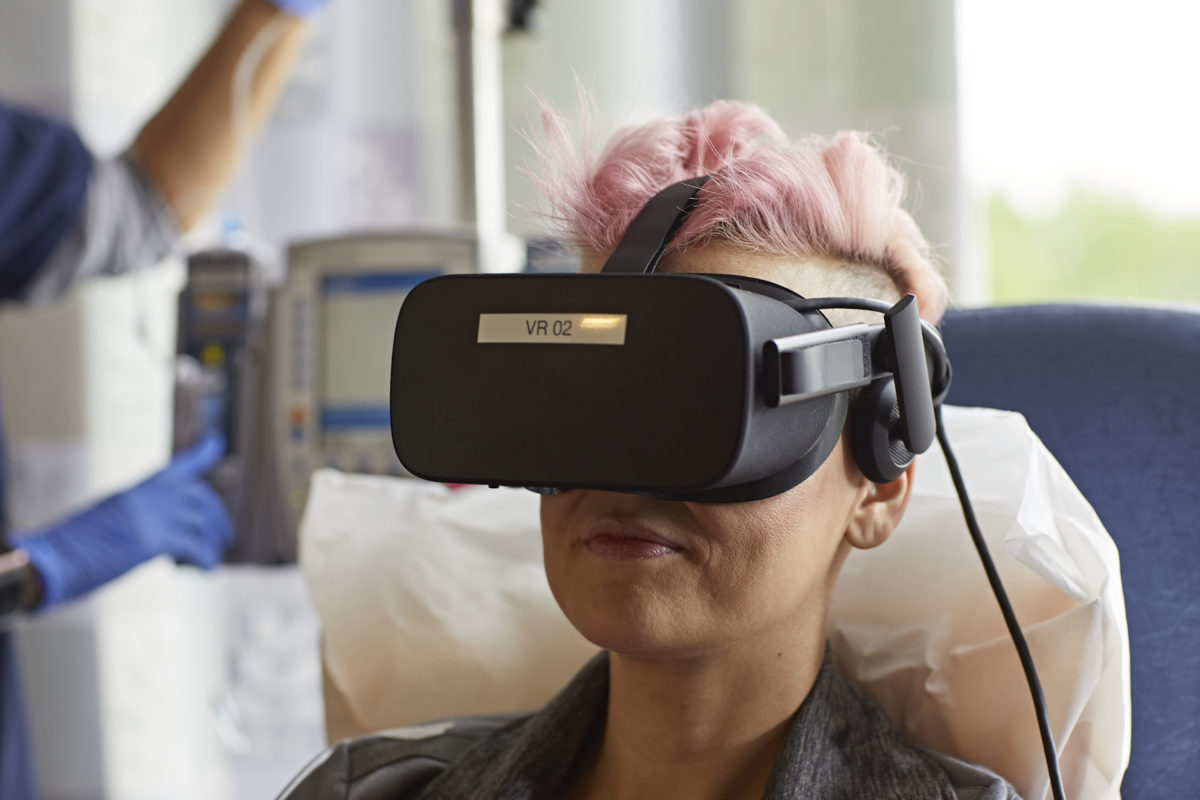Christiana Care Health System has won the prestigious 2018 Magnet Prize from the American Nurses Credentialing Center (ANCC) for using virtual reality technology to improve patients’ experience during chemotherapy at Christiana Care’s Helen F. Graham Cancer Center & Research Institute.
The ANCC, which promotes excellence in nursing and healthcare globally, awards this prize to Magnet-recognized organizations with unique programs where nurse-led innovative action transforms care delivery practices.
Christiana Care caregivers use virtual reality as a way for patients to immerse themselves in places outside the cancer center, whether those places are beaches, forests or popular destinations. The goal is to decrease the anxiety that comes with receiving chemotherapy.
 “This high-tech, positive distraction improves patients’ experience and gives our exceptional nurses an opportunity to demonstrate our system’s value of serving together with love,” said Ric Cuming, Ed.D., MSN, RN, NEA-BC, FAAN, Christiana Care’s chief nurse executive.
“This high-tech, positive distraction improves patients’ experience and gives our exceptional nurses an opportunity to demonstrate our system’s value of serving together with love,” said Ric Cuming, Ed.D., MSN, RN, NEA-BC, FAAN, Christiana Care’s chief nurse executive.
“We are thankful and humbled to receive the ANCC Magnet Prize in recognition of our efforts to improve patient care and outcomes.”
Graham Cancer Center nurses partnered with Christiana Care’s Health Technology & Innovation Center and Volunteer Services to bring the technology to patients. The idea was the brainchild of Susan Coffey Zern, MD, MSMS, CHSE, director of medical education at Christiana Care’s Virtual Education and Simulation Training Center.
A pilot study on the Virtual Reality program shows that the feedback from patients was overwhelmingly positive. All of the participants said they enjoyed the experience and would do it again; 98 percent said it was relaxing, and 64 percent said it reduced anxiety and boredom.
“Our objective was to offer our patients a positive, relaxing distraction, an escape from the confinement of the infusion suite and the boredom, anxiety or discomfort they may associate with their chemotherapy,“ said Cancer Program Clinical Director Cindy Waddington, MSN, RN, AOCN, NE-BC. “Nurses worked together as a team with all of our partners to bring this technology to patients.”
Beyond the usual amenities offered in any doctor’s office, Waddington found that some chemotherapy patients who visited the Graham Cancer Center Infusion Suite were asking for more creative ways to pass the time — hours for some — while tethered to their IV lines. The Innovation Center team surveyed the marketplace to find just the right equipment and then customized the software to make it easy to use for patients and volunteers.
“This is a great example of leveraging technology to make stronger human connections,” said Innovation Center Director Catherine Burch, MSM, CXA. “We loved hearing the memories from patients that the virtual world brought back for them from childhood to favorite vacations.”
The Oculus Rift VR headset was selected for use by the Innovation Center development team. Specially trained Christiana Care volunteers not only bring the virtual reality equipment to patients and adjust it for fit, sound and visual clarity, but provide additional socialization and respite for the patients.
The device connects to a laptop computer that runs the software. Patients can choose from scenery that includes a winter forest, Bavarian Alps, Irish landscapes, lush meadow, an Australian beach preserve and the beaches of Cape May, New Jersey. In the future, Christiana Care plans to include pre-chemotherapy education through virtual reality.
“ANCC is proud to recognize Christiana Care for its novel use of technology to create a more positive experience for patients and families,” said Jeff Doucette, DNP, RN, NEA-BC, CENP, LNHA, FAAN, FACHE, vice president of the Magnet Recognition Program and Pathway to Excellence. “This nurse-led innovation highlights the vision inherent in Magnet organizations to find unique solutions that break the mold of standard nursing practice.”
Christiana Care is a twice-designated Magnet health system. The Magnet Recognition Program recognizes healthcare organizations for quality patient care, nursing excellence and innovations in professional nursing practice. Consumers rely on the Magnet designation as the ultimate credential for high-quality nursing.
“Magnet recognition is a reflection of the nursing culture at our organization,” said Michelle Collins, DNP, APRN, CNS, ACNS-BC, RN-BC, NEA-BC, LSSBB, director of Magnet Recognition at Christiana Care. “This program is a great example of how nurses at Christiana Care are empowered to drive innovation so our patients can achieve optimal health.”



